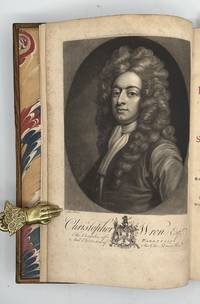signed first edition
1775 · New York
by [Hamilton, Alexander]
New York: James Rivington, 1775. First edition. iv, 78 (i.e. 79)pp. Errors in pagination as issued. 8vo. Later half calf and marbled paper boards, minor rubbing. Perforated stamp at bottom of title and final leaf, ink numerical stamp on verso of title. Provenance: A. Inglis (signature on title). First edition. iv, 78 (i.e. 79)pp. Errors in pagination as issued. 8vo. Alexander Hamilton's second work, written while a teenage student at King's College (now Columbia). It is the third round in a pamphlet war, replying to Samuel Seabury's A View of the Controversy (1774), which was itself a rejoinder to Hamilton's first publication, A Full Vindication of the Measures of Congress (1774). This well-reasoned argument by the young prodigy came several months later, but before the events at Lexington and Concord brought open war.
It is interesting that Hamilton's works were printed by James Rivington, who published most of the Tory tracts, including those by Samuel Seabury. Soon after this was published, in May 1775, a mob destroyed Rivington's press and Seabury was confined by revolutionaries. The supposed Loyalist printer is now thought to have been a Patriot agent while he remained in New York during the British occupation.
Two states of the first edition title page are noted: one with the second line of title in italic caps, third line has words "impartial" and "comprehensive" beginning with caps, and in imprint "James Rivington" is in caps and small caps; the second state (as here) has the second line of the title in full caps, the third line has the words "impartial" and "comprehensive" beginning with small letters, and in imprint "James Rivington" is in full caps.
This example, deaccessioned by the General Theological Seminary, is signed by A. Inglis, possibly Anne Inglis (1776-1827), the daughter of Bishop Charles Inglis, a noted Loyalist, the author of the reply to Paine's Common Sense titled The True Interest in America, and the rector of Trinity Church.
Hamilton's pre-Revolutionary pamphlets are among the rarest of Hamilton items. Only two examples appears in the auction records for the last quarter century. Howes H113, "b"; Ford 3; Sabin 29955; Evans 14096; American Independence 173; ESTC W12100 (Inventory #: 370986)
It is interesting that Hamilton's works were printed by James Rivington, who published most of the Tory tracts, including those by Samuel Seabury. Soon after this was published, in May 1775, a mob destroyed Rivington's press and Seabury was confined by revolutionaries. The supposed Loyalist printer is now thought to have been a Patriot agent while he remained in New York during the British occupation.
Two states of the first edition title page are noted: one with the second line of title in italic caps, third line has words "impartial" and "comprehensive" beginning with caps, and in imprint "James Rivington" is in caps and small caps; the second state (as here) has the second line of the title in full caps, the third line has the words "impartial" and "comprehensive" beginning with small letters, and in imprint "James Rivington" is in full caps.
This example, deaccessioned by the General Theological Seminary, is signed by A. Inglis, possibly Anne Inglis (1776-1827), the daughter of Bishop Charles Inglis, a noted Loyalist, the author of the reply to Paine's Common Sense titled The True Interest in America, and the rector of Trinity Church.
Hamilton's pre-Revolutionary pamphlets are among the rarest of Hamilton items. Only two examples appears in the auction records for the last quarter century. Howes H113, "b"; Ford 3; Sabin 29955; Evans 14096; American Independence 173; ESTC W12100 (Inventory #: 370986)




